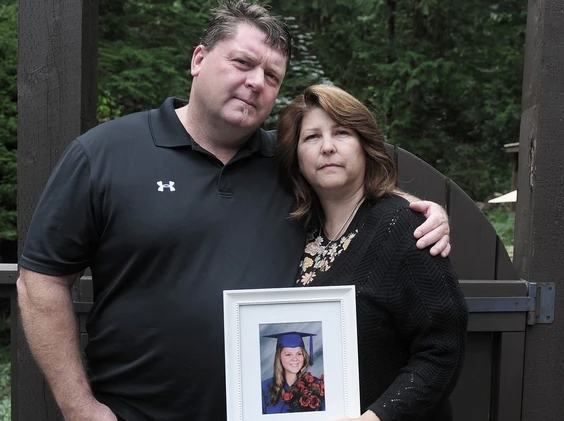As seen in Vancouver Sun by Glenda Luymes, 24th June 2023.
Under B.C. civil law, the value of human life is measured only by the victim’s future lost income if they have dependent children.

Dean and Tara Stroup with a photo of their daughter Madeline, who died after a car crash in 2019. Tara Stroup is advocating to change B.C.’s wrongful death laws to allow families of victims to receive compensation. Photo by NICK PROCAYLO / PNG /PNG
Tara Stroup lives “one thought away” from tears.
Four years ago in July, Stroup’s youngest daughter, Madeline, was killed in a crash that also took the life of her boyfriend, Hayden Turcotte. On a sunny afternoon, the young couple was driving to a family cabin when a man ran a stop sign on a country road in Abbotsford and slammed into their vehicle. Hayden, 22, died at the scene, while Madeline, 23, died in hospital several days later.
“Not a day goes by that she’s not on my mind,” her mother said Thursday.
Earlier this year, Stroup became involved with a group advocating to change B.C.’s wrongful death laws, which she said prevented her family from receiving compensation for Madeline’s death.
“I thought I lived in a place where life mattered,” she said. “But there’s been no justice, no accountability.”
Because Madeline did not have dependent children, B.C. civil law places little monetary value on her life. Compensation in cases of wrongful death caused by negligence is tied to the victim’s future earning potential and the age of their dependent children. Stroup said ICBC offered her family money for funeral costs. The driver of the vehicle that killed Madeline and Hayden did not face criminal charges.
“And that was it,” she said. “I know it’s too late for my family, but this has to change.”

A roadside memorial for Madeline Stroup and Hayden Turcotte. Photo by Francis Georgian /PNG
B.C.’s wrongful death law is based on a British law passed in 1846 and lags behind other Canadian provinces in terms of how it values human life, said Michael-James Pennie, president of the B.C. Wrongful Death Law Reform Society.
The grassroots group traces its origins back to the mid-1990s after the death of Heidi Klompas. The teen was at a party at Stokes Pit in Surrey when a drunk driver drove through the crowd. Heidi, 17, suffered two broken legs, while another girl died. Three weeks later, Heidi also died. A coroner’s investigation found her death was related to medical errors at the hospital.
Heidi’s mother Catherine Adamson was encouraged not to sue the doctors or hospital, because under B.C. law she would not receive compensation for the death of a child who had no dependents. Instead, she began to petition B.C. MLAs to change the law.
Since then, dozens of other families who have lost children have joined the wrongful death society. In story after story recounted in their own words on the society’s website, parents talk about their losses and the weight of injustice. The stories include one about a 23-month-old toddler who died after she was hit by a car while in her father’s arms waiting to cross the street in downtown Vancouver in 2021, and 16-year-old Lindsey Keen, who, in circumstances similar to that of Heidi Klompas, died in hospital after breaking her leg.
None have received significant compensation.

In a file photo from a rally in 2011, Catherine Adamson holds a book she wrote about her daughter Heidi Klompas, 17, who died after a car accident. Photo by Ian Smith /PNG
Pennie said the families deserve financial compensation for loss of love, care, guidance, affection and companionship. But they also want justice and accountability in cases where someone else’s negligence caused their loved one’s death, which could also “incentivize safety.”
“A right without a remedy is no right at all,” he said.
In 2015, the grassroots group became a society and began to push the B.C. Liberal government to update the law. When the NDP came to power, they began to lobby David Eby, who was “open and receptive,” said Pennie. But since then, the government has instituted no-fault insurance at ICBC, and they have heard little since.
The group wants B.C., like other provinces, to allow compensation for non-pecuniary losses, meaning losses that aren’t financial. They are not in favour of caps on the amount of compensation, but believe each case should be decided on the facts of what happened and the degree of negligence involved. In some cases where there is evidence of a coverup, punitive damages should also be considered, said Pennie.
“This can impact basically anyone,” he said about the “broad spectrum” of people advocating to change the B.C. law.
That includes British Columbians whose family members have died in police custody or prison, those who have died from medical mistakes in hospital, in motor vehicle accidents, or by burns caused by downed power lines.
“There’s numerous examples of egregious negligence that have gone completely unchecked,” he said. “Our law says people with young, dependent children have worth, and everyone else does not.”

In a file photo from 2019, neighbours Joyce Verwoerd and Camille Timmermans are overcome with emotion at a roadside memorial to Hayden Turcotte, 22, and Madeline Stroup, 23, who died in a car crash in Abbotsford. Photo by Francis Georgian /PNG
In a statement, the Ministry of the Attorney General said “grieving families need better support when there is a wrongful death.” The ministry is “working to update the family compensation act to give families an opportunity to address the injustice they have faced.”
But the statement did not provide a timeline or clarify whether support means bereavement benefits or improved ability for families to sue for compensation.

 ‘In Their Name’ is the campaign of ‘The BC Wrongful Death Law Reform Society’ – a BC registered non-profit organization comprised of volunteer families who have lost a loved one to wrongful death in BC and were denied access to justice. In response to the biggest human rights issue facing the province today, our goal is to modernize British Columbia’s antiquated wrongful death legislation, which predates confederation (1846). Under current legislation, the value of a human life is measured only by the deceased’s future lost income, so long as they had dependents.
‘In Their Name’ is the campaign of ‘The BC Wrongful Death Law Reform Society’ – a BC registered non-profit organization comprised of volunteer families who have lost a loved one to wrongful death in BC and were denied access to justice. In response to the biggest human rights issue facing the province today, our goal is to modernize British Columbia’s antiquated wrongful death legislation, which predates confederation (1846). Under current legislation, the value of a human life is measured only by the deceased’s future lost income, so long as they had dependents.